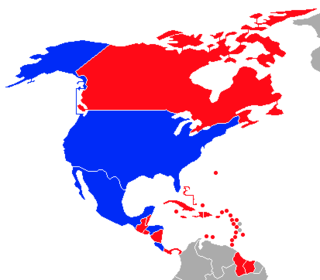Qualified teams
|
|
The men's qualification for the 1988 Summer Olympics. [1]
|
|
The European Qualifiers for the 1988 Summer Olympics tournament took place between 12 November 1986 and 31 May 1988. Italy, Sweden, Soviet Union, West Germany and Yugoslavia gained qualification to the Olympic tournament.
The South American Pre-Olympic tournament was held over a total of three groups from 18 April to 3 May 1987 in Bolivia, and saw Argentina and Brazil qualify.
The CONCACAF qualifying rounds and Pre-Olympic tournament was held from 25 January 1987 to 14 February 1988, and saw Mexico and United States qualify.
On 30 June 1988, FIFA banned Mexico from all competitions for two years due to the falsification of documents regarding the ages of players for the 1988 CONCACAF U-20 Tournament. FIFA confirmed on 5 July 1988 that Guatemala would replace Mexico in the final Olympic tournament in Seoul.
The African Qualifiers tournament for the 1988 Summer Olympics took place over a total of four rounds between 16 November 1986 and 31 January 1988. After the fourth round, Nigeria, Tunisia and Zambia gained qualification to the Olympic tournament.
The Pre-Olympic tournaments of the Asian Qualifiers for the 1988 Summer Olympic were held from 16 April 1987 to 26 October 1987. China PR and Iraq qualified, South Korea qualifying automatically as hosts.
The Oceanian qualifying rounds and Pre-Olympic tournament were held from 15 November 1987 to 27 March 1988. Australia qualify.

Hugo Sánchez Márquez is a Mexican former professional footballer and manager, who played as a forward. A prolific goalscorer known for his spectacular strikes and volleys, he is widely regarded as the greatest Mexican footballer of all time, one of the best players of his generation, and one of the best strikers of all time. In 1999, the International Federation of Football History and Statistics voted Sánchez the 26th best footballer of the 20th century, and the best footballer from the CONCACAF region. In 2004, Sánchez was named in the FIFA 100 list of the world's greatest living players.
The Canada men's national soccer team represents Canada in international soccer competitions since 1924. They are overseen by the Canadian Soccer Association, the governing body for soccer in Canada. They have been a member of FIFA since 1948 and of CONCACAF since 1961.

The Guatemala national football team represents Guatemala in men's international football and is controlled by the Federación Nacional de Fútbol de Guatemala. Founded in 1919, it has been affiliated to FIFA since 1946, as a member of CONCACAF.

The Bahamas national football team is controlled by the Bahamas Football Association; it was founded in 1967 and joined FIFA in 1968. Bahamas has never qualified for the FIFA World Cup or the CONCACAF Gold Cup. They have been a part of CONCACAF since 1967.
The 2006 FIFA World Cup qualification competition was a series of tournaments organised by the six FIFA confederations. Each confederation – the AFC (Asia), CAF (Africa), CONCACAF, CONMEBOL, OFC (Oceania), and UEFA (Europe) – was allocated a certain number of the 32 places at the tournament. A total of 197 teams entered the qualification process for the 2006 FIFA World Cup. In 2001 FIFA ended automatic qualification of the reigning champion, so that 2002 champions Brazil became first to participate in the qualifying tournament. The hosts (Germany) retained their automatic spot.
The CONCACAF W Championship is an association football competition organized by the Confederation of North, Central American and Caribbean Association Football (CONCACAF) that often serves as the qualifying competition to the Women's World Cup, and recently the Olympics. In years when the tournament has been held outside the World Cup qualifying cycle, non-CONCACAF members have been invited. CONCACAF is the governing body for football for North America, Central America and the Caribbean. The most successful country has been the United States, winning their ninth title in 2022.
The men's qualification for football tournament at the 2008 Summer Olympics. FIFA restricted entry to players born after January 1, 1985.
The CONCACAF Women's Olympic Qualifying Tournament was an international football (soccer) event in the North America, Central America and the Caribbean region, and was the qualification tournament for the Olympic Games.
The 2014 FIFA World Cup qualification was a series of tournaments organised by the six FIFA confederations. The 2014 FIFA World Cup featured 32 teams, with one place reserved for the host nation, Brazil. The remaining 31 places were determined by a qualification process, in which the other 207 teams, from the six FIFA confederations, competed. Most of the successful teams were determined within these confederations, with a limited number of inter-confederation play-offs occurring at the end of the process.

The CONCACAF qualification for the 2014 FIFA World Cup consisted of four rounds of competition, in which the 35 member nations competed for three automatic berths at the finals in Brazil.
The men's qualification for the 2012 Summer Olympics. FIFA restricted entry to players born after 1 January 1989.
Association football is the most popular sport in almost all North, Central American and Caribbean countries, and eleven members of the Confederation of North, Central American and Caribbean Association Football, CONCACAF, have competed at the sport's biggest event – the men's FIFA World Cup.
Football at the 1980 Summer Olympics started on 20 July and ended on 2 August.
The North, Central American and Caribbean section of the 2018 FIFA World Cup qualification acted as qualifiers for the 2018 FIFA World Cup in Russia, for national teams which are members of the Confederation of North, Central American and Caribbean Association Football (CONCACAF). 3.5 slots in the final tournament were available for CONCACAF teams.
The men's qualification for the 1984 Summer Olympics.
The men's qualification for the 1972 Summer Olympics.
The men's qualification for the 1976 Summer Olympics.
The 2020 CONCACAF Men's Olympic Qualifying Championship was the fifteenth and final edition of the CONCACAF Men's Olympic Qualifying, the quadrennial, international, age-restricted football tournament organised by CONCACAF to determine which men's under-23 national teams from the North, Central America and Caribbean region qualify for the Olympic football tournament.
The 2020 CONCACAF Women's Olympic Qualifying Championship was the fifth edition of the CONCACAF Women's Olympic Qualifying, the quadrennial international football tournament organized by CONCACAF to determine which women's national teams from the North, Central American and Caribbean region qualify for the Olympic football tournament. CONCACAF announced on 5 November 2019 that the United States would host the tournament between 28 January to 9 February 2020.
Twelve teams are scheduled to compete in the women's football tournament at the 2024 Summer Olympics. In addition to France, the host nation, 11 women's national teams qualified from six separate continental confederations.